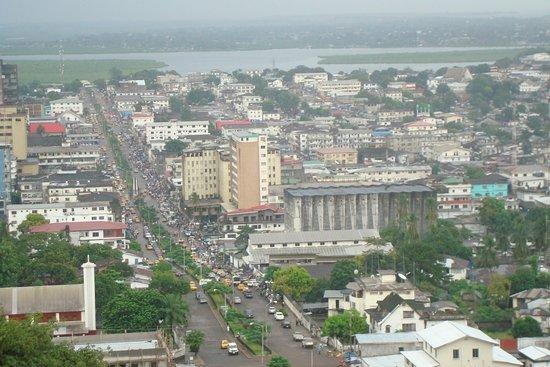Happy Independence to All

Monrovia, Liberia, Photo Credit: Shadi Alkasim (Shadi_Alkasim, févr. 2019)
Tomorrow is Independence Day, July 26, 2022 and it marks the 175th anniversary of Liberia’s independence declared on this date in July 1847. In that 1847 Declaration of Independence the settlers (former slaves and free people of color from the United States of America) levied charges of injustice against their mother country, the land of their birth, the United States of America.
Amongst others, this is what they had to say:
“We, the people of the Republic of Liberia, were originally inhabitants of the United States of North America.
In some parts of that country we were debarred by law from all rights and privileges of man—in other parts, public sentiment, more powerful than law, frowned us down.
We were excluded from all participation in the government.
We were taxed without our consent.
We were compelled to contribute to the resources of a country which gave us no protection.
We were made a separate and distinct class, and against us every avenue of improvement was effectively closed. Strangers from other lands, of a color different from ours, were preferred before us.
We uttered our complaints, but they were unattended to, or only met by alleging the peculiar institutions of the country.
All hope of a favorable change in our country was thus wholly extinguished in our bosoms, and we looked with anxiety for some asylum from the deep degradation…”
The western coast of Africa was the place selected by American benevolence and philanthropy for our future home. Removed beyond those influences which oppressed us in our native land, it was hoped we would be enabled to enjoy those rights and privileges and exercise them in common with the rest of mankind…”
As we observe the 175th anniversary of our nation’s birth, all Liberians are implored to reflect on what we have been able to achieve as a nation after all these years. Let us pause and reflect on the picture painted by statistics published by the Liberia Institute for Statistical Geographic Information Services (LIGIS).
For example, according to LISGIS, 29.3 of Liberian males age 5-17 are engaged in child labor while 34.3 percent of females between 5-17 years of age are engaged in child labor.
More to that 41 percent of males and 30 percent of females age 6 and older have no formal education. Additionally only 16 percent of women and 27 percent of men aged 15-49 have completed senior high school or a higher level of education.
Meanwhile, only 1 percent of women and 4 percent of men have access to three (3) specified types of mass media (newspaper, television and radio) on a weekly basis.
Further, according to LISGIS, “child mortality has declined since the 2013 LDHS. However, under-5 mortality has remained relatively stagnant, and infant mortality has increased.
Over the 5 years prior to the 2019-20 LDHS, infant, child, and under-5 mortality rates were 63, 33, and 93 deaths per 1,000 live births, respectively.
Nutritional status of children: 30% of children under age 5 are stunted (short for their age), 3% are wasted (thin for their height), 11% are underweight (thin for their age), and 4% are overweight (heavy for their height).
Additionally, the prevalence of anemia in children aged 6- 59 months stands at 71 percent of children, while 45 percent of women age 15-49 years are anemic. Five percent of women age 15-49 are thin (a body mass index [BMI] below 18.5), while 37% are overweight or obese.
While child mortality has declined since the 2013 LDHS, according to LISGIS, “under-5 mortality has remained relatively stagnant, and infant mortality has increased.
Over the 5 years prior to the 2019-20 LDHS, infant, child, and under-5 mortality rates were 63, 33, and 93 deaths per 1,000 live births, respectively
As regards access to electricity, 76 percent of households do not have access to electricity, while more than fifty percent of households do not have access to improved toilet facilities.
In the face of such dismal and rather dire statistics, how can we justifiably boast of nearly two centuries of existence as a nation but with little to show for it?
The founding fathers of this nation in the Declaration of Independence wrote: “Liberia is not the tool nor offspring of grasping ambition”. But 175 years later, it appears as though Liberia has indeed become a tool and offspring of grasping ambition.
Corruption has taken center-stage and virtually threatens the stability of this nation. The economy is caught in a tailspin and downward spiral with no signs of recovery in sight.
Independence Day is perhaps the single and foremost national holiday that Liberians cherish and hold to the heart. This is when, aside from Christmas, Liberians generally spend lavishly to eat, drink, buy new clothes for the children etc.
But this year, most Liberians have nothing to look forward to. As a female vendor put it, “this July 26 season is hard, no business and you can see that there are more sellers than buyers at the various market places.
Nevertheless, Liberians are a resilient people and there is no doubt that they will cope with the situation even though they bear hard witness to public officials’ lavish display of wealth and opulence in the midst of extreme economic hardship.
But just how long they will be ready to accept such a lot remains unclear; but there is sufficient evidence in history to suggest that Liberians are indeed capable of standing up to dictatorship and misrule.
There can be no doubt about this in the face of historical evidence showing that within two decades Liberians have shaken off two seemingly powerful and bloody tin pot dictators.
The question now foremost on the minds of the public, as we approach elections in 2023, is just who or which individual in whom Liberians can place their trust to deliver the nation from further decline. Only time will tell.
Happy Independence to all!
